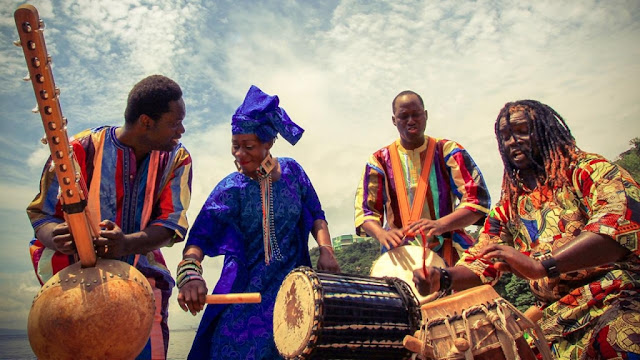Unraveling the International Expansion of Haitian Vodou: Exploring its Evolution as Religion, Culture, Cult, and Spiritual Movement
Unraveling the International Expansion of Haitian Vodou: Exploring its Evolution as Religion, Culture, Cult, and Spiritual Movement
Haitian Vodou, a complex and dynamic spiritual tradition originating in Haiti, has experienced a significant expansion beyond its borders in recent decades, emerging as a global phenomenon with diverse manifestations and interpretations.
This paper investigates the multifaceted nature of Vodou's international expansion, examining its transformation from a localized religious practice to a global cultural phenomenon, cultic expression, and spiritual movement.
Drawing upon historical analysis, ethnographic research, and theoretical frameworks from anthropology and religious studies, this paper explores the factors driving Vodou's global diffusion, its diverse expressions in different cultural contexts, and the implications of its expansion for the future of this spiritual movement.
Therefore, Haitian Vodou, often characterized by its syncretic blend of African, Catholic, and indigenous beliefs, has transcended its origins in Haiti to become a global cultural force, influencing art, music, literature, and popular culture around the world.
This paper seeks to explore the international expansion of Haitian Vodou, examining its evolution as a religion, culture, cult, and spiritual movement in diverse global contexts. By unpacking the factors driving Vodou's global diffusion and exploring its diverse expressions and interpretations, we can gain deeper insights into the future trajectory of this dynamic and multifaceted spiritual tradition.
To understand the international expansion of Haitian Vodou, it is essential to consider the historical context in which the tradition emerged and evolved. Vodou traces its roots to the complex interplay of African, Catholic, and indigenous spiritual practices brought to Haiti during the transatlantic slave trade.
Over the centuries, Vodou has served as a source of resistance, resilience, and cultural identity for Haitians, shaping their beliefs, practices, and worldview. The globalization of Vodou can be traced back to the Haitian diaspora, which spread the tradition to North America, Europe, and beyond, as well as to the increasing interest in alternative spiritualities and indigenous traditions in the Western world.
As Vodou has spread beyond Haiti's borders, it has taken on new forms and expressions in different cultural contexts. In North America, Europe, and Latin America, Vodou has been embraced by practitioners seeking spiritual healing, empowerment, and connection to ancestral traditions.
Vodou temples, ceremonies, and rituals have proliferated in urban centers, offering a space for worship, community, and cultural revival.
However, the global diffusion of Vodou has also led to syncretism and hybridization, as practitioners blend elements of Vodou with other spiritual traditions and practices.
In addition to its religious expression, Haitian Vodou has exerted a profound influence on global culture, shaping art, music, literature, and popular culture around the world. Vodou imagery, symbolism, and mythology have been appropriated and reinterpreted by artists, writers, and musicians, contributing to a broader renaissance of interest in African diasporic cultures and spirituality.
However, this cultural commodification of Vodou has also led to misrepresentation, appropriation, and distortion of its sacred symbols and practices in mainstream media and consumer culture.
Alongside its religious and cultural manifestations, Haitian Vodou has also been portrayed and perceived as a cultic phenomenon in some contexts, characterized by sensationalized portrayals of witchcraft, sorcery, and occult practices.
This portrayal of Vodou as a dangerous or deviant cult has contributed to misunderstanding and stigma, particularly in Western societies where alternative spiritualities are often marginalized or demonized. However, for many practitioners, Vodou represents a source of empowerment, healing, and spiritual liberation, challenging dominant narratives of religious orthodoxy and conformity.
Future Trajectory: The future of Haitian Vodou as a global spiritual movement remains uncertain, shaped by a complex interplay of cultural, political, and social forces. As interest in indigenous traditions, alternative spiritualities, and decolonization grows, Vodou is likely to continue to attract new adherents and practitioners seeking spiritual authenticity, cultural connection, and social transformation.
However, the globalization of Vodou also poses challenges, including cultural appropriation, commodification, and distortion of its sacred symbols and practices.
Moving forward, it is essential to foster dialogue, collaboration, and mutual respect among practitioners, scholars, and the wider community to ensure the integrity, sustainability, and vitality of Haitian Vodou as a global spiritual movement.
In conclusion, the international expansion of Haitian Vodou represents a complex and multifaceted phenomenon, encompassing religious, cultural, cultic, and spiritual dimensions. As Vodou has spread beyond Haiti's borders, it has undergone significant transformations, adapting to new cultural contexts while retaining its core beliefs, practices, and symbolism.
While the globalization of Vodou has brought greater visibility and recognition to the tradition, it has also raised questions about authenticity, representation, and cultural appropriation. Moving forward, it is essential to approach the study and practice of Haitian Vodou with sensitivity, respect, and humility, recognizing the diversity of expressions and interpretations within the tradition.
By fostering dialogue, collaboration, and mutual understanding among practitioners, scholars, and the wider community, we can ensure the continued vitality, integrity, and relevance of Haitian Vodou as a global spiritual movement in the 21st century.
Written by : Ernst Georges / September 23 2024







Comments
Post a Comment